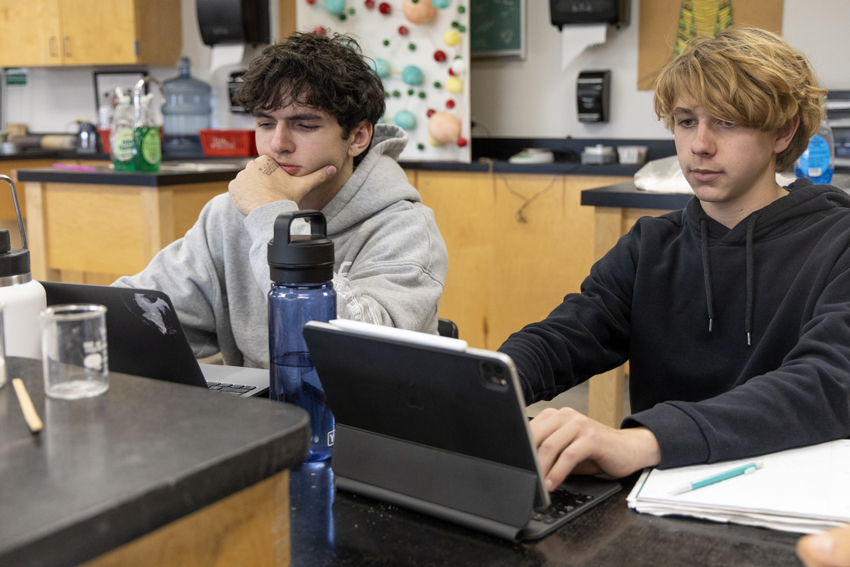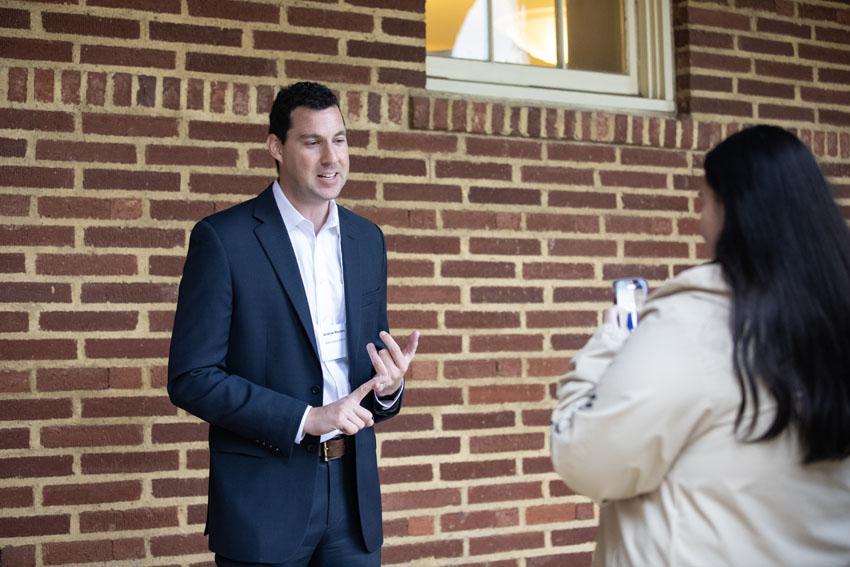UC educator, Lynn Sullivan works with AP biology class

Lynn Sullivan journeyed down from her position as an educator at Southern Sierra Critical Zone Observatory (CZO) and UC Merced, to speak about ecosystem trends and preservation with Karen Walter’s AP (advanced placement) Biology students on Sept, 1. Sullivan plans to aid students in research of the local forest systems and their subsequent effect on the current water crisis over the next few weeks.
Walter’s recently started research on forest ecology after attending a forest service lecture on water usage. She stumbled upon UC Merced’s studies on the topic and later contacted Sullivan about the possibility of a student research opportunity.
Walters says that this partnership with the UC will provide students with a more realistic view of science in the field.
“Students will number one get to see how real science is done,” Walters said. “They will also get to meet people who are involved in the university system. It kind of connects FC to the UC system’s so they’ll know us and we’ll know them a little bit. It will also give them a feel of what goes on outside the classroom, what real scientists actually do. It will show them what it’s really like and give them more exposure.”
Walters and Sullivan aim to create an opportunity for students to study near the observatory sometime within the month of October. The trip however, depends upon prior rainfall in the area, due to the extreme importance of water as a variable in the experimentation process.
Specifically in regards to the forest habitat the importance is that the public understand why were thinning trees, the public understand why we might be doing the forest management. Everybody has a kind heart for tress because we know how valuable they are for producing oxygen and for stabilizing our ecosystems and purifying the water. These are all functions of the tree so when people see logging and destruction of forest habitat they become very concerned. If we alleviate their worries and fears by educating the public maybe they will be more supportive of our actions. –Lynn Sullivan
Sullivan hopes students learn the value of water conservation through her presentations. She wants to communicate the idea that the water dilemma may affect future generations.
“They will learn the importance of water not just during a drought year but every year and that the impact of the drought that we are experiencing now may affect future years,” Sullivan says.” If we know how to use our resources wisely we could learn sustainability for the future for not only this generation but the next generation.”
Sullivan attended undergraduate studies at California State University Fresno (CSUF) and obtained a minor degree in chemistry and a major degree in biology. Upon graduation Sullivan worked in the medical industry for several years before the continuation of her studies at UC Merced.
At UC Merced Sullivan earned a Master’s Degree in environmental systems. She specialized in hydrology, the study of various properties and distribution of water. This interest in water bound ecosystems drew Sullivan to research the effects of humans on the Merced River, the natural spawning grounds of salmon.
Currently, Sullivan teaches an introductory course at UC Merced called Environmental Crisis. In addition, she works at Southern Sierra Critical Observatory to educate the public about the theories and actions of ecologist in the area.
This particular CZO was established in 2007 to study interactions between various elements and factors in the Sierra Nevada region. The observatory numbers among six other such facilities that receives official support from the National Science Foundation (NSF). Today Southern Sierra CZO continues to flourish with positions of study for graduate and undergraduate students.
According to Sullivan, one of both her and the Southern Sierra CZO’s major aims involves the education of the public.
“Specifically in regards to the forest habitat the importance is that the public understand why were thinning trees, the public understand why we might be doing the forest management,” Sullivan said. “Everybody has a kind heart for tress because we know how valuable they are for producing oxygen and for stabilizing our ecosystems and purifying the water. These are all functions of the tree so when people see logging and destruction of forest habitat they become very concerned. If we alleviate their worries and fears by educating the public maybe they will be more supportive of our actions.”
Over the course of early September, Sullivan has taught the second period class with a collection of power point presentations. Upon one occasion Sullivan brought several leaf samples from dry regions for students to observe.
Juliana Rosik,’ 16′ says that Sullivan’s presentation interpreted text book data into real life circumstances.
“I really like what Mrs. Sullivan had to say today in class,” Rosik said. “She defiantly knew her topic and it’s interesting to see how ecology, the unit we’re studying plays a role in the environment around us. She really makes things come alive with her presentation and her knowledge.”
Andrew Moore, ’16’ also appreciated the real life application. He says Sullivan’s teaching style was straight forward and insightful.
“I thought that her presentation was engaging and helpful,” Moore said. “She covers topics in a methodical way that was easy to understand. It was interesting to see a person who was able to apply the principles we learned in class in their career.”
In the event of a field study near the observatory, students will create class and personalized projects to test the efficiency of plot maintenance. The class began to speculate and form hypothesis about these studies after Sullivan’s initial visit. An individual research paper is also required from the students at the end of the experience.
Sullivan says the individual aspects of the project cause students to consider practical applications for these ecological issues.
“This is where you get to be at the helm of the ship and decide what you do,” Sullivan said. “Using the information that we presented today we are hoping you come up with a project that is a little bit in depth about how we should maintain our plots, how we should measure our plots and what’s feasible at this time of year.”
One of Sullivan’s main objectives is to present the various in field job opportunities available to youth. She advises student interested in a particular branch of science to become well read and passionate about the subject now.
“Pick a subject that you love because you will be reading it forever.” Sullivan said. “If you love what you’re doing you will be amused for the rest of your life. Weather you’re interested in a certain field of medicine or anything else. Start reading about it now and lifting your ears up at the programming you’re being exposed to now. If that’s what your desire is…maybe that’s something that you should pursue.”
For more features, please read Local fire Captain Pete Dern earns long-awaited homecoming.
This writer can be reached via Twitter: @skylerklee and via email: Skyler Lee.






